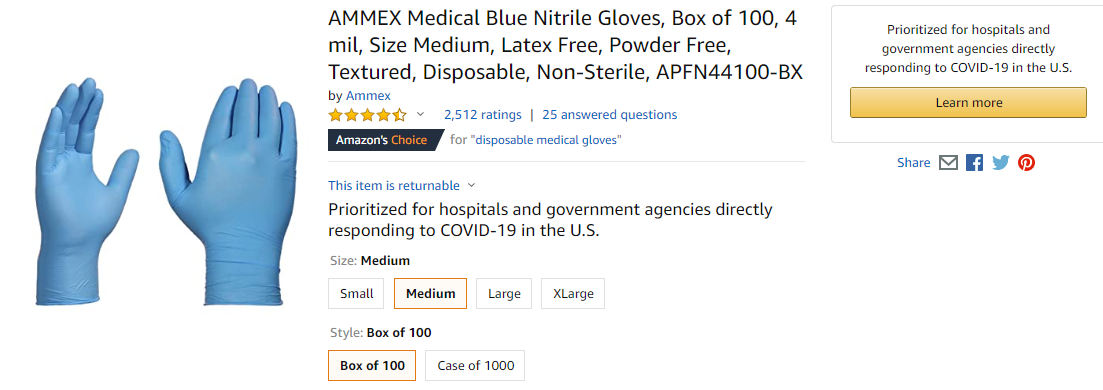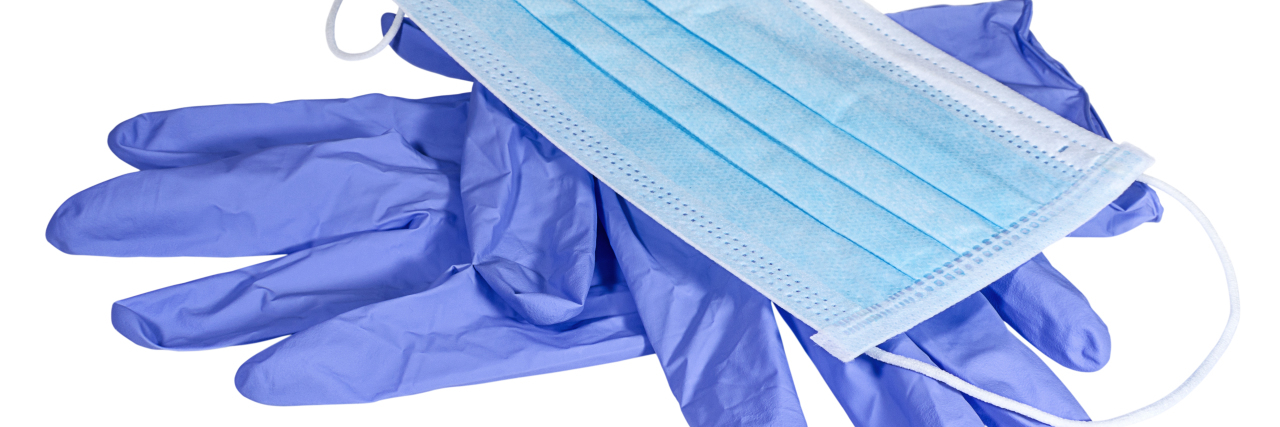The Problem With Amazon Blocking Sales of Certain Medical Supplies
Sometimes the news isn’t as straightforward as it’s made to seem. Karin Willison, The Mighty’s senior contributor editor, explains what to keep in mind if you see this topic or similar stories in your newsfeed. This is The Mighty Takeaway.
Many people with disabilities and chronic illnesses depend on personal protective equipment (PPE) such as gloves and masks to keep ourselves and our caregivers safe all the time — not just during the coronavirus pandemic.
Now, the need for people with disabilities to have PPE for our everyday lives is magnified. Many of us can’t completely physically distance from people, especially our caregivers, but we still need to protect ourselves from exposure to COVID-19. However, due to a new form of medical rationing by Amazon.com and other companies, we are at risk of losing access to the medical supplies we need to do just that.
According to Vox, as of April 1 — in an attempt to curb individuals stocking up on medical supplies — Amazon has restricted sales of N95 masks, facial shields, surgical gowns, surgical gloves, and large-volume sanitizers to hospitals and government organizations. But by doing so, they have made it exponentially more difficult for people with health conditions to obtain these supplies that are just as essential for us.
To use myself as an example, I have cerebral palsy and use a power wheelchair, so I need help with personal and household care. To ensure safe and hygienic conditions for myself and my personal care assistants, I regularly purchase non-latex disposable gloves for them to wear while helping me with certain tasks, such as using the bathroom. Since I am at high risk of experiencing life-threatening symptoms if I contract COVID-19, they currently need to wear gloves in more situations than usual, including getting the mail, bringing in grocery deliveries, and sterilizing surfaces around the house. They are also now wearing masks because of the pandemic.
In anticipation of the extra need and the likelihood that supplies might run short, I purchased some extra boxes of gloves on Amazon a few weeks ago. Still, I thought it would be a good idea to purchase a couple more boxes, as I now anticipate being stuck at home for months, maybe years, trying to stay safe until a vaccine becomes available.
The gloves I usually buy came up as unavailable, which didn’t surprise me, but when I went to the Amazon website to search for non-latex gloves, I noticed something new and disturbing. While many listings for gloves remain on the website, almost all of them are now labeled as being reserved for hospitals and therefore unavailable to purchase. The text on these items reads: “Prioritized for hospitals and government agencies directly responding to COVID-19 in the U.S.”

But where does that leave people who need home health care? When I read their statement, it felt like a slap in the face, as if they were saying, “We have the lifesaving supplies you need, but you are not worthy of purchasing them.”
Amazon does have an application you can fill out to gain access to these supplies, but the only options listed are state government, federal agency, U.S.-accredited hospital and “other.” Nursing homes and home health agencies aren’t included, let alone people who hire their own caregivers. There is no recognition that we even exist. Sure, I could apply as “other” but I strongly suspect it would be a waste of time.
I have always paid for my disposable medical supplies out of pocket. Although there are ways to get Medicaid coverage for them in some states, it’s complicated and your choice of products is limited, so it’s been easier to buy them myself and write it off my taxes as a medical expense. I never imagined people with chronic health conditions could be de facto banned from purchasing basic medical supplies like gloves and masks online.
Unlike ventilators, gloves are simple and inexpensive to produce. I see no reason why Amazon should not continue to offer them to those in need. I am also deeply concerned that as of writing this article, the few gloves still available to the public are not Prime, will take weeks to arrive, and/or are made of latex, which can trigger life-threatening allergic reactions in many people with spina bifida and other conditions.
I contacted Amazon’s live chat support regarding this issue. The customer service representative told me that even though I employ healthcare workers, they cannot sell me gloves and I would need to contact a local healthcare provider who is distributing supplies. Amazon’s process was clearly developed without any understanding that many healthcare workers do not have a hospital or agency that can supply them with personal protective equipment.
In my case, I have consumer-directed services through Medicaid in my state. This means I choose and hire my own assistants, and Medicaid pays them through an online billing system. They do not work for an agency and there’s no one to supply them with PPE except me, their employer. And now Amazon is telling me that I’m not allowed to buy the supplies I need to ensure a safe working and living environment. I am far from alone in this situation — many people at high risk for COVID-19 are being cared for by family and friends, non-agency home health workers and others who cannot access PPE through channels other than the retail market.
Have I found non-latex gloves elsewhere? Yes. There are still ways to find COVID-19 safety supplies, if you’re fast enough to grab them when they go up for sale and if you can pay extra — two big “ifs” that present huge barriers for low-income people. In effect, a massive, powerful corporation is now making life-and-death decisions about who gets personal protective equipment and who doesn’t, and as a result, people with disabilities and chronic illnesses will almost certainly fall through the cracks.
Amazon’s policy on these items is shortsighted and dangerous. Their actions may increase the risk of people who would otherwise stay healthy contracting a disease, whether it be COVID-19 or an infection caused by a lack of safety equipment. There are better ways to solve this problem without endangering high-risk people. For example, Amazon could limit the quantity of supplies people can purchase to prevent reselling and price gouging.
Considering the vast amount of data Amazon collects about customers, they should be able to prioritize individuals who have a history of buying medical supplies. I’ve had a Subscribe and Save order for years now, and my account shows I’ve purchased the same box of gloves 19 times, so clearly I need them for a reason that existed prior to the coronavirus pandemic. It’s also reasonable to assume people might need more than usual, and allow a modest increase, such as purchasing two boxes at a time instead of one. For those without a history of buying medical supplies, they could require them to affirm they need supplies for an at-risk person or caregiver, and again, limit the quantity they can purchase.
Businesses and governments need to stop blocking people with disabilities and chronic illnesses from accessing the care, equipment and support we need during this pandemic. If we are going to flatten the curve, we must prevent those who are most likely to be hospitalized or worse from getting infected. Ensuring people with disabilities and chronic illnesses have access to PPE now can exponentially reduce the amount of PPE hospitals will need later, and help stem the tide of suffering and death from COVID-19 cases that could have been prevented. Do the right thing here, Amazon. We need our PPE!
The Mighty has connected with an Amazon representative and will update this article if we receive further information.
Concerned about coronavirus? Stay informed with these articles:
- If I Get COVID-19 It Might Be Ableism – Not the Virus – That Kills Me
- The Problem With Saying ‘Only’ the Elderly and Immunocompromised Will Be Affected by COVID-19
- Why I’m Worried About Rationing If My Child With Down Syndrome Gets COVID-19
- I’m Afraid I’ll Be Told to ‘Sacrifice’ My Health for COVID-19 Patients
Getty image by UserGI15632523.

